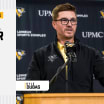When it comes to Wilkes-Barre/Scranton, a word that is heard so much around there is balance. Because right now, that's something they are excelling at and is a big reason they rank first overall in the American Hockey League standings.
WBS Excelling at Finding Balance

Head coach Clark Donatelli, who will coach the Atlantic Division at the upcoming AHL All-Star Classic, has been especially adept at finding that balance with his team.
"It's a balance of development versus winning," said Penguins associate general manager Jason Botterill, who is the GM of WBS. "It's a balance of veteran and young players. It's a balance of comforting and giving them enthusiasm but also holding people accountable. He's done a great job."
WBS has a 22-7-3 record, good for 47 points. They are in the top-five for goals against (second), goals for (fourth) and the penalty kill (second); and recently had a seven-game win streak.
Individually, Jake Guentzel is first in the AHL with 18 goals and is tied for second with 34 points - and was just named the CCM/AHL Rookie of the Month for December. Meanwhile, teammate Oskar Sundqvist also ranks in the top-10 in league scoring.
"I just think it's an exciting brand of hockey right now," Botterill said. "I think they're playing with a lot of enthusiasm and they've found different ways to win games. Whether it's smart defensive hockey, winning a tight, low-scoring game or being able to pop some goals in and create some offense. I think they've been entertaining and they've also been extremely consistent."
WBS has been especially impressive since the start of last season, when Mike Sullivan's team started 12-1. That continued when Donatelli - who had been head coach of the Penguins' ECHL affiliate Wheeling - took over following Sullivan's promotion to Pittsburgh last December. The team went 12-3-1 to open the year and have continued to roll throughout the first half-plus.
"We've got a good leadership group in the room and the guys all work hard, they're committed and they want to get better," Donatelli said. "Our guys, the way we practice, our practice habits and attention to detail, watching film, the guys are a pleasure to coach and they all want to get better. It seems to be someone different every night coming up and playing, but all the guys overall are playing extremely well."
It would be difficult to reach that level of success if it wasn't for the importance that the Penguins organization places on making sure the team has everything they need to find that balance, something that Sullivan noticed when he first joined the franchise.
"Based on my experience of being around the league, I think the way the Pittsburgh Penguins go about how they view the overall game plan in trying to compete for championships and the value they place on the development aspect is second to none," Sullivan said.
"I think Wilkes-Barre is the key indicator there. They place a high emphasis on that experience for their young players and they put all their resources behind it, financially and otherwise. What takes place in Wilkes-Barre is critically important to the overall health of our organization in trying to stay competitive. I think our ownership and our management team do a terrific job in making sure that Wilkes-Barre gets what they need to optimize that development aspect."
VETERANS AND YOUNG PLAYERS
It begins with that balance of veterans and rookies, which is a testament to the job done by management and the hockey ops staff to add the right players into the organization.
Of course, before that it starts with director of amateur scouting Randy Sexton and his staff for the drafting they have done to add players like Guentzel, Sundqvist, Tristan Jarry, Teddy Blueger and Dominik Simon.
Then from there, Botterill and the Penguins' pro scouting staff - Derek Clancey, Al Santilli and Ryan Bowness - have done an excellent job of identifying and signing good, quality people who complement those young players.
"'Botts' does a great job of making sure the team has the proper balance of veteran leadership and that mix where the rookies and draft picks that we're signing come in," Donatelli said. "And also making sure we have an environment down here that these guys can learn and mature and get better. It all starts with management and the scouts and the drafts, and getting quality people people that it's a pleasure for us as a staff to work with.
"Good character people, good humans as we say and second, hockey players. If you start with that recipe of doing your due diligence of them being really good people and by the way, they're really good hockey players also, that's a recipe for success. So I think Botts has done a great job of doing his due diligence and putting the right recipe down here."
No one epitomizes being a good human more than Tom Kostopoulos, the 19-year pro and captain who's completely embraced his role as a mentor to the young guys that come through that dressing room. He's someone where it seems like every player who gets called up to Pittsburgh specifically mentions him by name as someone who has helped them.
"The mental aspect of it, the mental preparation, I think that's a big part of our leadership group, especially with TK being a 19-year pro," Donatelli said. "The mindset of going into a rough, tough schedule or stringing together three in four nights, playing four in six nights, playing games on the road and how you mentally get through those games and how you mentally prepare for that - that's a big challenge for the staff but we embrace it.
"We've got some strong kids, and they're learning. And the only way to go through that for some of these young guys is to go through it with our veteran leadership and to go through that process."
Guentzel specifically mentioned that group by name when talking about what has helped him have so much success down in WBS.
"I think the veterans we have in this room, just to see how they prepare and what they bring to the table each day, that makes it special and it's fun to be a part of," he said.
Then take, for example, July 1, where the Pens either signed or re-signed Cameron Gaunce, Stuart Percy, Chad Ruhwedel, David Warsofsky and Garrett Wilson - all veteran pros who have seen time in the NHL.
"As much as you want to give your young players a lot of responsibility, sometimes they're not ready for it," Botterill explained. "Having that complement, we've been so fortunate with the veteran players that we've brought in there. It's obviously a credit to them, but it's a credit to our professional scouts too.
"All these players have done an excellent job of buying into what our system is, been able to give us games at the National Hockey League level when needed and have also been great leaders at the American Hockey League level."
DEVELOPMENT AND WINNING
That being said, the No. 1 priority down in Wilkes-Barre is development - and that's an area Donatelli excels.
"My job and our job here as a staff is to develop these players and to make sure they're readily available when Pitt needs them," Donatelli said. "Everyone wants to win, but my primary job down here is to make sure these guys are developing and getting better. And that's what we do."
What impresses Botterill the most about Donatelli is his ability to get the most out of players. He holds players accountable, but also has a relationship with them and is clear with them on what they have to do to get to the National Hockey League.
"All the players down here, they know when they go up they have to do it 97 percent right all the time," Donatelli said. "To get to that number is a process that these kids go through down here and it can be frustrating at times. But you've got to just keep sticking with it and keep instilling confidence in these guys and when they do it right, praise them. You can't just be harping on them when they're doing it wrong. You've got to capture those moments when things are going good and you have to let them know that you see the details and the habits."
Apart from instilling confidence, Donatelli said they truly do want their players to come to the rink and just try to get better each day. And whether it's a small step one day or a big step over the weekend, the biggest thing is to be consistent about it.
"For example, how do you handle momentum swings? Stuff like that," Donatelli said. "Situational awareness on the ice, during a game, you go through that process and that development and say 'hey, this happened last week' and you learn from it. It's not a new experience for you after you go through it. Those are the growing pains with the young guys, to go through it, but it's been great. Got to have hard conversations with some of the guys, that's just part of developing. But our job is to develop the players and make sure they're readily available for Pitt when they need to be called upon. And so far, so good."
It really is so far, so good, as Sullivan can attest.
"Clarkie's done a nice job in making sure these guys are well-prepared," Sullivan said. "When guys get called up, it's a very smooth transition. We're playing similar styles with similar strategies and concepts. And so the call-up process has been seamless and I think Clark and his staff deserve a lot of credit for that, for how they're coaching those guys. These guys are getting better. They're improving each time that we see them when they come up. That's the process.
TWO ASSISTANTS
Speaking of the staff, it helps that the organization decided to hire two assistants for this season instead of their usual one, bringing in Chris Taylor and J.D. Forrest to join Donatelli behind the bench.
"It's the way our sport is going now," Botterill said. "Development is so key. Just like we've added to our development staff over the last couple years, we felt it was important to add another assistant coach down there just to improve with the communication. So much of it nowadays is 1-on-1 meetings and it's just overwhelming for two people. You need to have three people."
Taylor, who played 19 years of pro hockey in North America and Europe before moving into coaching for the last five seasons, oversees the forwards and the power play. Forrest, who played nine years of pro hockey in North America and Europe and spent last year coaching in Austria, has the defense and penalty kill.
Donatelli oversees it all while managing the players' personalities and ice time, making sure everybody is getting what they need and evaluating what they're doing in their roles. Then the three of them have a lot of meetings to go over all the players' games, shifts and clips.
"It's been really good," defenseman David Warsofsky said. "When you have someone that's focused on the D the whole game, someone that's focused on the forwards, it kind of gives the head coach a lot more room to just coach and teach and not so much worry about lines and all that kind of stuff."
PLACE TO PLAY
And finally, at the end of the day, WBS is just a terrific place to play, plain and simple.
It may technically be a minor-league affiliate, but everything about the organization is major league. The team plays in a beautiful venue, Mohegan Sun Arena at Casey Plaza, and has a state-of-the-art practice facility, The Ice Rink at Coal Street Park.
It opened in 2009 and features a beautiful locker room, weight room and players' lounge. And all of that is because of CEO/Governor Jeff Barrett, who has been with the team since it was started in 1999.
"Just the atmosphere that management with Jeff Barrett and his staff have created here, it's a good environment," Kostopoulos said. "They have created an environment where it is a great developing environment. Guys come in here, work hard, the goal is to get to Pittsburgh. No one gets content here. Happy to be here, but the goal is always to move on to Pittsburgh. With the coaches they've brought in, the decisions they've made and the way they develop, the way we play here, I think creates a good environment for players to develop and coaches to develop."


















































